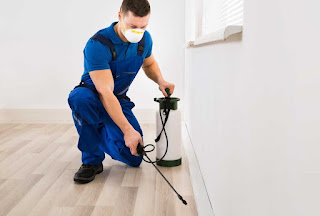How Often Should You Get a Termite Inspection? Expert Recommendations
Termites, the silent destroyers, can wreak havoc on your property without you even knowing it. These tiny pests have an insatiable appetite for wood, and if left unchecked, they can cause extensive damage to your home or business.
That's why termite inspection Brisbane is crucial—they help identify and address termite infestations before they become a full-blown disaster.
But how often should you get a termite inspection? In this blog post, we will delve into expert recommendations and shed light on the optimal frequency of termite inspections to protect your property from these relentless invaders.

1. The Sneaky Nature of Termites: Why Inspections Are Essential
Termites are masters of stealth. They can hide in the tiniest cracks and crevices, making their presence difficult to detect. By the time you notice visible signs of termite damage, such as sagging floors or hollow-sounding wood, the infestation may already be well-established. Regular termite inspections act as a proactive measure to catch these pests early on before they cause significant harm. They allow trained professionals to assess the property, identify signs of termite activity, and implement necessary preventive measures to safeguard your investment.
2. Factors Affecting Inspection Frequency: Location and Risk
The frequency of termite inspections depends on several factors, with location and risk being key considerations. Properties located in regions with high termite activity, such as warm and humid climates, may require more frequent inspections. Similarly, if your property has a history of termite infestations or is situated in an area prone to termite problems, more regular inspections are recommended. Additionally, factors such as the age and construction of your property can influence the likelihood of termite issues. Consulting with a termite professional can help determine the optimal inspection schedule based on these factors.
3. Expert Recommendations: How Often Should You Get a Termite Inspection?
While there is no one-size-fits-all answer, experts generally recommend getting a termite inspection Brisbane at least once a year. Annual inspections serve as a proactive measure to catch termite activity early and prevent extensive damage. However, in high-risk areas or for properties with a history of termite issues, more frequent inspections, such as bi-annual or quarterly, may be necessary. It's important to note that these recommendations are general guidelines, and it's always best to consult with a termite professional who can assess your specific situation and provide personalised advice.
4. Peace of Mind and Long-Term Protection
Regular termite inspections offer peace of mind and long-term protection for your property. They provide an opportunity to detect termite activity in its early stages when treatment options are more effective and less costly. By investing in preventive measures through routine inspections, you can safeguard your property, save on potential repair costs, and maintain its value over time. Remember, prevention is key when it comes to termite control, and regular inspections play a vital role in keeping these destructive pests at bay.
Conclusion
Termite inspections are an essential part of property maintenance and protection. They help uncover termite infestations before they cause significant damage and allow for timely intervention. While the recommended frequency of termite inspection Brisbane is typically once a year, it's important to consider factors such as location, risk, and property history to determine the optimal inspection schedule. By staying proactive and partnering with termite professionals, you can ensure the long-term integrity of your property and enjoy peace of mind knowing that your investment is safeguarded against these hidden invaders.



Comments
Post a Comment